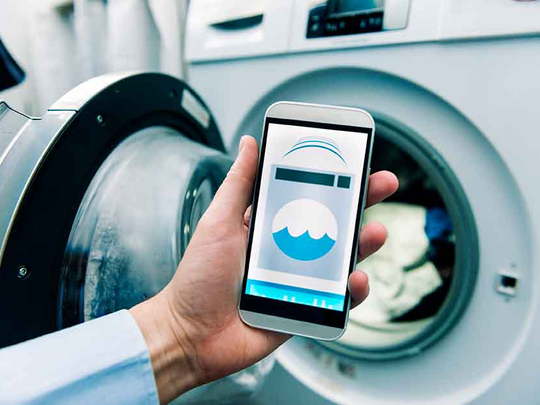
Smart home appliances were first teased a couple of years ago, but we’re now beyond the prototype concept stage. Stores near you will soon be stocked with Wi-Fi-driven washing machines and deep-learning refrigerators. But what does the internet of things (IoT) do for you and how does it change your life?
Let’s look at air conditioning, which makes up a huge part of electricity bills in the UAE, but hooking an AC up to IoT could change this. “Air conditioners with IoT will have the ability to analyse a user’s life patterns and movements and can concentrate air flow on the frequently used areas such as the sofa in the living room,” Yong Geun Choi, President of LG Gulf, tells GN Focus.
The heart of every kitchen is the fridge, so it’s inevitable this is leading the IoT wave. Smart chill boxes include such features as voice recognition and large touchscreens that let users order ingredients from online shops. “The smart refrigerator will have the ability to analyse a user’s shopping history, purchase frequency and preferences in terms of brand and volume and make recommendations or even complete the transaction so the product is delivered as soon as it runs out,” adds Choi.
Bosch’s Home Connected washing machines, meanwhile, can detect different types of fabric, load volume and dirtiness of clothes inside to allocate the optimal amount of water and detergent. This not only saves time, energy and money (through lower utility bills) but also extends the lifespan of clothes.
As IoT enables the control of and communication with appliances via smartphones, artificial intelligence offers a tantalising glimpse of new possibilities. Instead of just focusing air flow on a person binge-watcing Netflix on the couch, the AC could learn what time they like to do this and begin cooling the spot in advance. Or a coffee machine could prepare a double espresso for one person in the house and a cappuccino for another by identifying individual users and automatically building a profile for each.
A big challenge in giving machines the ability to recognise objects, people and actions in context has always been the massive amount of data required, but this could soon change. Last week the MIT Technology Review reported that Gamalon, a Boston-based start-up, has developed the foundations of technology that solves this problem by allowing computers to learn faster with fewer data inputs.
Home appliances are already smart — giving them common sense is the next frontier.












